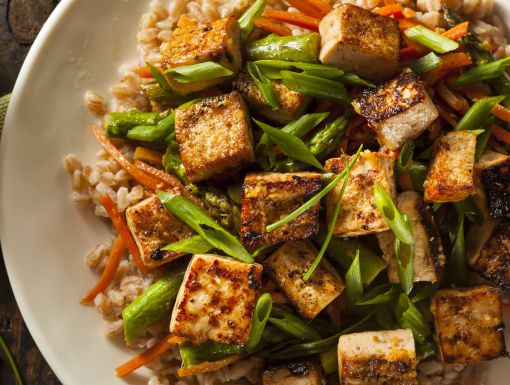
Eating to Maintain a Healthy Weight During COVID-19
Being overweight puts you at risk for many diseases, including heart disease, diabetes and high blood pressure. Current information and data also show that people diagnosed with COVID-19 and are obese are at a higher risk of becoming critically ill than those with COVID-19 who are not obese.
This means that it’s more important than ever before for overweight people strive to maintain a healthy weight.
Weight and stress: What’s the connection?
During this unprecedented time, stress levels are exceptionally high. Increased stress levels can lead to a rise in cortisol (aka “the stress hormone”) which can result in an increased appetite. This is further accentuated by a decrease in daily exercise (being stuck at home doesn’t help) and an increase in alcohol consumption.
While we can’t eliminate stress from our lives, we can control our reactions to stress. We can also control our behaviors to avoid weight gain and perhaps even shed some pounds to become our leanest, fittest selves. Many of these behaviors are connected to movement, sleep and nutrition.
Read on to learn how to avoid emotional eating and stress cravings while quarantining and get tips on maintaining a healthy weight during coronavirus.
Have a plan
Try writing down your meals and snacks for the day the night before or the morning of. Having a blueprint of your daily food consumption can help you have some direction. Here’s an example:
- Prepare breakfast (maybe a green smoothie with protein powder or scrambled eggs and whole-grain toast).
- Participate in a Zoom meeting or complete other work task.
- Exercise before lunch.
- Squeeze in some more work. Grab a healthy snack.
- Take a short walk while joining a work call.
- Cook dinner.
- Watch a movie, read, enjoy a new hobby and wind down
It also helps to plan ahead for those limited grocery store trips. Plan out healthy recipes ahead of time (check out the Eat Fit Cookbook for ideas), then write down a list for what you need and avoid going to the grocery store hungry.
Keep a food log
Food logging is the gold standard of weight loss, as it helps keep you accountable for every meal and snack. In fact, a recent study showed that those who kept daily food logs lost twice as much weight as people who didn’t.
A food log doesn't have to be anything fancy. You can keep a simple note of meals and snacks in a journal or use an app to log your daily calorie intake as well as protein, fiber, etc. A great (and free) food tracker app is My Fitness Pal. This increase in awareness of your eating habits can translate to healthier behaviors, which are essential for losing weight and – more importantly – keeping it off.
Keep it simple
My recommendation is to keep your diet simple, streamlined and wholesome. Focus less on strict rules and lists of dos and don’ts, and more on the key fundamentals:
- Limit added sugars and white carbs.
- Emphasize lean proteins.
- Incorporate tons of vegetables, some fruits (mostly berries).
- Plant based fats when possible.
- Find what works for your lifestyle, taste, budget and schedule. Of course, it can be difficult to get creative with healthy foods during a time when access to food can be limited. Some ideas: canned chicken or tuna, low-sodium beans, fresh or frozen vegetables, low-fat Greek yogurt, light string cheese, nuts and eggs.
Avoid mindless snacking
Many of us are combating quarantine boredom by binging Netflix, and this behavior is often associated with mindless snacking of chips, sweets and popcorn as well as consumption of alcohol, all of which can contribute to weight gain.
Before you reach for a snack, ask yourself: “Am I actually hungry or am I just bored or stressed?” If you are not hungry, step away from the fridge. If you are hungry, opt for snacks that are less than or equal to 150 calories, have at least 5 grams or more of fiber and protein combined, and have less than 6 grams of sugar per serving.
Some other things to keep in mind while snacking:
- Avoid eating in front of a screen. Rather, sit down at a table to avoid distractions while eating.
- Avoid eating from the bag, pint or jar. Portion out your serving into a small bowl or plate and put the item away.
- Avoid liquid calories such as soft drinks, fruit juice and energy drinks. Aim to drink only sugar-free, low-calorie beverages. Substitute with water, herbal tea or sparkling water.
Move it, move it
Moderate exercise releases endorphins which reduce stress and improve mood. Simply getting out of the house for a short walk, breathing fresh air can help you de-stress and maintain a healthy weight.
And every little bit helps. Walk around for a few minutes every half hour of sitting, or at least stand up and stretch. Stand when you’re on the phone. Walk to talk with a colleague instead of calling or emailing. Stretch during commercials when you’re watching TV.
There are also plenty of YouTube videos that can help you get creative with your workouts. (Check out Ochsner Fitness Center’s workout videos.) Download an exercise app or simply put on some music and dance! Make the most of this extra free time.
To schedule a virtual nutrition consultation, email nutrition@ochsner.org.
Consult a nutritionist for an individualized plan
As a registered dietitian, it’s no surprise that my top recommendation for sustained, lasting improvements to health and wellness is to work one-on-one with a registered dietitian who can tailor a nutrition plan to suit your needs. Consider booking a virtual consultation with an Ochsner dietitian.
Check out my FUELED podcast for more tips on develop a customized nutrition plan, including what types of foods are best to eat, how much of each and when.
The information in this blog post is accurate at the time of publication. However, as the situation surrounding COVID-19 continues to change, it's possible that information has changed since being published. While Ochsner Health is trying to keep our blog posts as up-to-date as possible, we also encourage readers to stay informed on news and recommendations by using the CDC
website.



